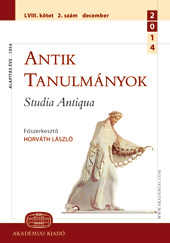Az uralkodói és polgártükör mint irodalmi műfaj gyökereihez
The roots of the ruler and citizen mirror as a literary genre
Author(s): László HavasSubject(s): Cultural history, Ancient World, Greek Literature, Theory of Literature
Published by: Akadémiai Kiadó
Keywords: Mirrors for princes; wisdom literature; civis bonus; Cato; Sempronia; Q. and M. Cicero; Augustus philosophy; historiography; Christian monarchy; Charles the Great; Pope Gelasius; vicarius Dei;
Summary/Abstract: Mirrors for princes are one of the oldest forms of European literary culture, with roots in the wisdom literature of the Ancient East, in which the personal instructions of a ruler to his son were known from very early times. This form, however, remained alien to Greek literature for a long time because the notion of eleutheria contradicted the principle of monarchic power to be passed from father to son. The situation was more or less similar in Rome, where the aristocratic society contented itself with the declaration of moral concepts considered to be non-appealable. Change came with the conquest of the Mediterranean region when the old social framework was beginning to be decomposed and the ideal of civis bonus was outlined, which appeared in the form of parental admonitions or instructions from relatives (Cato, Sempronia, Q. and M. Cicero). Augustus himself, the creator of the new monarchic order, laid the foundations of good government as a parens patriae for his “sons”, the citizens of Rome. Radical change, however, followed when the monarchic ideal was integrated into more general forms of culture and civilization, i.e. philosophy and historiography, as in Greece. In the Latin tradition guidance provided by wise people to rulers survived and continued into the period after the emergence of Christian monarchy. The laudation of the monarch was assigned to poets, grammatici and rhetors, fathers of the Church, who were supposed to glorify God as well as his vicar on earth. In the Franconian Empire this tradition was revived, which applies to Charles the Great’s time as well. Later, when the concept of dual power put forward by Pope Gelasius strengthened, it became obvious that it was the duty of the Church to instruct the monarch. After the solidification of theocratic power in the Holy Roman Empire a new type of monarchic mirrors emerged. Saint Stephen’s Admonitions marked a new start: he appeared as a real vicarius Dei, whose personal instructions provided in his capacity as monarch replaced the role of the Church in educating the successor.
Journal: Antik Tanulmányok
- Issue Year: 56/2012
- Issue No: 1
- Page Range: 65-89
- Page Count: 25
- Language: Hungarian
- Content File-PDF

